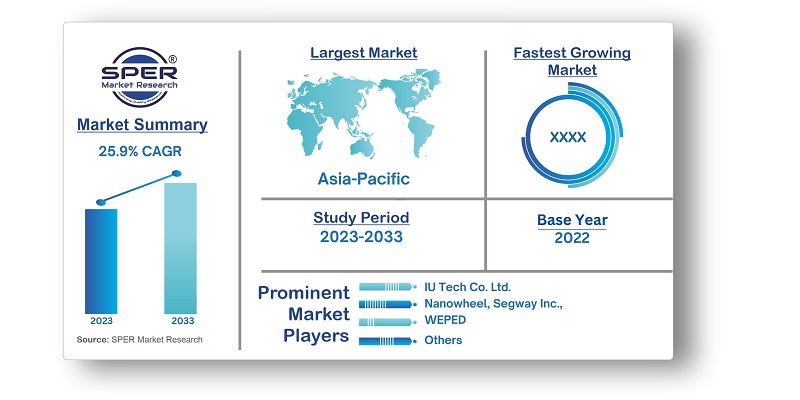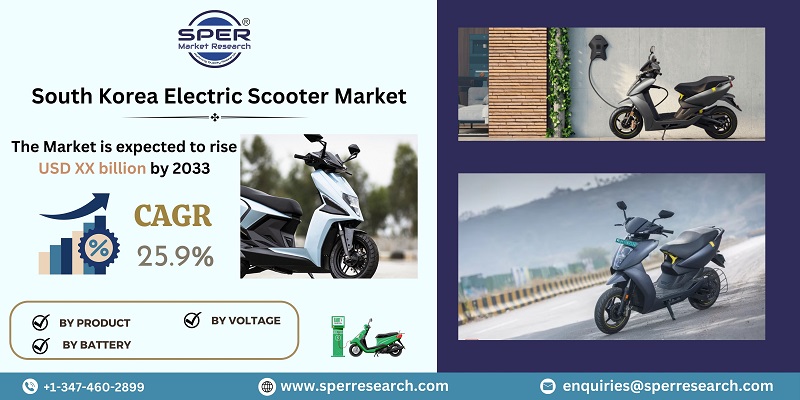
South Korea Electric Scooter Market Growth, Size, Trends, Revenue, Scope and Future Challenges
South Korea Electric Scooter Market Size- By Product, By Battery, By Voltage- Regional Outlook, Competitive Strategies and Segment Forecast to 2033
| Published: Jul-2023 | Report ID: AMIN23117 | Pages: 1 - 108 | Formats*: |
| Category : Automotive & Transportation | |||
- Market development in 2023-2033: driven by the Government Support and Regulations: Through a number of programmes and legislation, the South Korean government has been actively pushing the use of electric vehicles, including electric scooters. This involves fostering the development of charging infrastructure, offering subsidies and incentives for the purchase of electric vehicles, and putting policies in place to encourage and control the use of electric scooters.
- Environmental Concerns: As people and governments become more conscious of environmental concerns like air pollution and greenhouse gas emissions, they look for greener transportation options. Due to their zero emissions during operation, electric scooters are a sustainable and environmentally benign means of transportation.

- Opportunities for South Korea Electric Scooter Market
- Government Support: Opportunities for expansion are presented by the South Korean government's strong support for electric cars, particularly electric scooters. Infrastructure improvements, tax breaks, and subsidies are all part of this effort to promote the use of electric scooters.
- Urbanization and Last-Mile Connectivity: Electric scooters have the potential to be effective last-mile mobility options in South Korean cities due to their dense population. Electric scooters can make the transition easier and less congested between public transport hubs and final destinations.
- One of the major challenges for South Korea Electric Scooter Market
- Infrastructure Development: Electric scooter adoption continues to be hindered by the accessibility and availability of charging infrastructure. To reduce range anxiety and encourage the use of electric scooters, it will be essential to expand the charging network throughout cities, parking lots, and public locations.

| Report Metric | Details |
| Market size available for years | 2019-2033 |
| Base year considered | 2022 |
| Forecast period | 2023-2033 |
| Segments covered | By Product, By Battery, By Voltage |
| Regions covered | Busan, Daegu, Gyeonggi Province, Incheon, Seoul, Other Metropolitan Areas |
| Companies Covered | IU Tech Co. Ltd., Nanowheel, Segway Inc., WEPED, Xiaomi Corporation |
- Aftermarket Distributors and Retailers
- Automotive Industry Associations
- Automotive Interior Material Suppliers
- Automotive Manufacturers
- Design and Engineering Teams
- Investors and Financial Institutions
- Regulatory Authorities and Safety Organizations
- Research and Development Centres
| By Product: |
|
| By Battery: |
|
| By Voltage: |
|
- South Korea Electric Scooter Market Size (FY’2023-FY’2033)
- Overview of South Korea Electric Scooter Market
- Segmentation of South Korea Electric Scooter Market By Product (Folding, Retro, Standing/Self-Balancing)
- Segmentation of South Korea Electric Scooter Market By Battery (Li-Ion, NiMH, Sealed Lead Acid)
- Segmentation of South Korea Electric Scooter Market By Voltage (24V, 36V, 48V, Above 48V)
- Statistical Snap of South Korea Electric Scooter Market
- Expansion Analysis of South Korea Electric Scooter Market
- Problems and Obstacles in South Korea Electric Scooter Market
- Competitive Landscape in the South Korea Electric Scooter Market
- Impact of COVID-19 and Demonetization on South Korea Electric Scooter Market
- Details on Current Investment in South Korea Electric Scooter Market
- Competitive Analysis of South Korea Electric Scooter Market
- Prominent Players in the South Korea Electric Scooter Market
- SWOT Analysis of South Korea Electric Scooter Market
- South Korea Electric Scooter Market Future Outlook and Projections (FY’2023-FY’2033)
- Recommendations from Analyst
1.1. Scope of the report1.2. Market segment analysis
2.1. Research data source
2.1.1. Secondary Data2.1.2. Primary Data2.1.3. SPER’s internal database2.1.4. Premium insight from KOL’s
2.2. Market size estimation
2.2.1. Top-down and Bottom-up approach
2.3. Data triangulation
4.1. Driver, Restraint, Opportunity and Challenges analysis
4.1.1. Drivers4.1.2. Restraints4.1.3. Opportunities4.1.4. Challenges
4.2. COVID-19 Impacts of the South Korea Electric Scooter Market
5.1. SWOT Analysis
5.1.1. Strengths5.1.2. Weaknesses5.1.3. Opportunities5.1.4. Threats
5.2. PESTEL Analysis
5.2.1. Political Landscape5.2.2. Economic Landscape5.2.3. Social Landscape5.2.4. Technological Landscape5.2.5. Environmental Landscape5.2.6. Legal Landscape
5.3. PORTER’s Five Forces
5.3.1. Bargaining power of suppliers5.3.2. Bargaining power of buyers5.3.3. Threat of Substitute5.3.4. Threat of new entrant5.3.5. Competitive rivalry
5.4. Heat Map Analysis
6.1. South Korea Electric Scooter Market Manufacturing Base Distribution, Sales Area, Product Type6.2. Mergers & Acquisitions, Partnerships, Product Launch, and Collaboration in South Korea Electric Scooter Market
7.1. South Korea Electric Scooter Market Value Share and Forecast, By Product, 2023-2033
7.2. Folding7.3. Retro7.4. Standing/Self-Balancing
8.1. South Korea Electric Scooter Market Value Share and Forecast, By Battery, 2023-20338.2. Li-Ion8.3. NiMH8.4. Sealed Lead Acid
9.1. South Korea Electric Scooter Market Value Share and Forecast, By Voltage, 2023-20339.2. 24V9.3. 36V9.4. 48V9.5. Above 48V
10.1. South Korea Electric Scooter Market Size and Market Share
11.1. South Korea Electric Scooter Market Size and Market Share By Product (2019-2026)
11.2. South Korea Electric Scooter Market Size and Market Share By Product (2027-2033)
12.1. South Korea Electric Scooter Market Size and Market Share By Battery (2019-2026)12.2. South Korea Electric Scooter Market Size and Market Share By Battery (2027-2033)
13.1. South Korea Electric Scooter Market Size and Market Share By Voltage (2019-2026)13.2. South Korea Electric Scooter Market Size and Market Share By Voltage (2027-2033)
14.1. South Korea Electric Scooter Market Size and Market Share By Region (2019-2026)14.2. South Korea Electric Scooter Market Size and Market Share By Region (2027-2033)14.3. Busan14.4. Daegu14.5. Gyeonggi Province14.6. Incheon14.7. Seoul14.8. Other Metropolitan Areas
15.1. IU Tech Co. Ltd.
15.1.1. Company details15.1.2. Financial outlook15.1.3. Product summary15.1.4. Recent developments
15.2. Nanowheel
15.2.1. Company details15.2.2. Financial outlook15.2.3. Product summary15.2.4. Recent developments
15.3. Segway Inc.
15.3.1. Company details15.3.2. Financial outlook15.3.3. Product summary15.3.4. Recent developments
15.4. WEPED
15.4.1. Company details15.4.2. Financial outlook15.4.3. Product summary15.4.4. Recent developments
15.5. Xiaomi Corporation
15.5.1. Company details15.5.2. Financial outlook15.5.3. Product summary15.5.4. Recent developments
15.6. Others
SPER Market Research’s methodology uses great emphasis on primary research to ensure that the market intelligence insights are up to date, reliable and accurate. Primary interviews are done with players involved in each phase of a supply chain to analyze the market forecasting. The secondary research method is used to help you fully understand how the future markets and the spending patterns look likes.
The report is based on in-depth qualitative and quantitative analysis of the Product Market. The quantitative analysis involves the application of various projection and sampling techniques. The qualitative analysis involves primary interviews, surveys, and vendor briefings. The data gathered as a result of these processes are validated through experts opinion. Our research methodology entails an ideal mixture of primary and secondary initiatives.



Frequently Asked Questions About This Report
PLACE AN ORDER
Year End Discount
Sample Report
Pre-Purchase Inquiry
NEED CUSTOMIZATION?
Request CustomizationCALL OR EMAIL US
100% Secure Payment






Related Reports
Our Global Clients
Our data-driven insights have influenced the strategy of 200+ reputed companies across the globe.




















